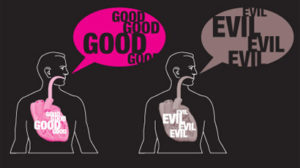2. A Biblical Understanding of the Heart (continued)
2.2 Our Terminology
 1:26) (Adams, 1979:114). It is consistently used to refer to the whole of our immaterial, invisible inner life (and thus is often closely linked with “soul” and “spirit”), in contrast to our visible, outer man (Adams, 1979:114). And despite “cardiology” being only a physical-medical term today, one should remember that it stems from a Greek term for heart, “kardia”, thus making a ‘cardiology’ also a legitimate realm for spiritual physicians and counsellors. Likewise, every soul-helper should remember that they are engaged in true “psychology” (the study of the “psyche”, the Greek word often referring to the “soul”). One of my professors used to say, “The heart is the mission control centre of life.” This is precisely what Proverbs 4:23 states: “Above all else, guard your heart, for it is the wellspring of life.” We live out of our hearts (Tripp, 1995:19-24; van der Walt, 2001:16). Here is some of what Scripture shows originating in the heart: thinking, loving, hating, fearing, remembering, knowing, discerning, perceiving, talking, reasoning, understanding, doubting (Gen. 6:5; Deut. 6:5; Lev. 19:17; Ps. 119:11; Deut. 8:5; Prov. 18:14; Eph. 1:18)(Adams, 1979:114).
1:26) (Adams, 1979:114). It is consistently used to refer to the whole of our immaterial, invisible inner life (and thus is often closely linked with “soul” and “spirit”), in contrast to our visible, outer man (Adams, 1979:114). And despite “cardiology” being only a physical-medical term today, one should remember that it stems from a Greek term for heart, “kardia”, thus making a ‘cardiology’ also a legitimate realm for spiritual physicians and counsellors. Likewise, every soul-helper should remember that they are engaged in true “psychology” (the study of the “psyche”, the Greek word often referring to the “soul”). One of my professors used to say, “The heart is the mission control centre of life.” This is precisely what Proverbs 4:23 states: “Above all else, guard your heart, for it is the wellspring of life.” We live out of our hearts (Tripp, 1995:19-24; van der Walt, 2001:16). Here is some of what Scripture shows originating in the heart: thinking, loving, hating, fearing, remembering, knowing, discerning, perceiving, talking, reasoning, understanding, doubting (Gen. 6:5; Deut. 6:5; Lev. 19:17; Ps. 119:11; Deut. 8:5; Prov. 18:14; Eph. 1:18)(Adams, 1979:114).direction except the mirror, holding anyone or anything in our environment responsible except ourselves. Emotional
 disturbances among youth must have been caused by a bad upbringing or peer ‘victimisation’. ‘Innocent’ youth are blindly led away into immorality, addictions, or crime by oppressive peer pressure. Angry or depressed youth easily blame parents for not building up their self-esteem, or not nurturing their self-actualisation.
disturbances among youth must have been caused by a bad upbringing or peer ‘victimisation’. ‘Innocent’ youth are blindly led away into immorality, addictions, or crime by oppressive peer pressure. Angry or depressed youth easily blame parents for not building up their self-esteem, or not nurturing their self-actualisation. 
Remember that the ship is governed most by the set of the sails, not the direction of the breeze (Tripp, 1995:19). None of us is passively moulded by life’s influences; rather, our hearts actively interact with our experiences based upon our Godward orientation (Tripp, 1995: 10-17). We must realise that every person is a worshipper, at all times. The question is only: Who is being worshipped, God or idols? (cf. Exod. 20:3-4; Ezek. 14:1-8, “heart idols”; Rom. 1:18-32; 1 Cor. 10:14; Eph. 5:5; Col. 3:5; 1 Jn. 5:21, etc.) Likewise, Scripture repeatedly shows that we are constantly seeking, craving, trusting, fearing, loving, and serving someone or something (e.g., Prov. 3:5-6; Jer. 17:5-7; Matt. 6:24, 32-33; 10:28; Gal. 1:10; 2 Tim. 3:4). Rather than our circumstances mastering us, it is actually the object of our worship and our desires that will most determine our outlook on life.
As creatures made in God’s image, we are always “active responders” to life, never merely “passive receivers” (Tripp, 1995:16).

Who then can deny, despite many other severe problems faced by today’s youth, that their hearts are the heart of the problem? Despite their frequent lack of real ‘heart-awareness’, beneath everyone of their personal and interpersonal problems lies an inner self that is constantly choosing how to respond and whom to serve. Young people are interpreters. They do not live life based on the facts alone, but based on their interpretations of the facts. Unkind friends do not force a teen into anger or depression; rather, that teen has concluded (interpreted) that he cannot trust God’s sovereignty, wisdom, and goodness in hard times and must rather react and take things into his own hands in some way.
Our biblical evaluation now leaves us with an inescapable implication: Unless our youth experience change at the heart level, all efforts at reforming them are like stapling fruit onto the branches of a dead tree. Surely there are some temporary benefits to behavioural adjustments, but true and lasting change must come from within (Col. 2:20-23; Tripp, 1997:110-113; van der Walt, 2002:16, 34). But how? How can this be accomplished for our contemporary youth? What is required – repaired hearts, or more nurtured hearts, or more educated hearts? No – only new hearts will do! Nothing short of a complete heart transplant will rescue our young people. But there is hope – God is in the business of heart transplants and has a 100% success rate and eternal warranty!
 – Tim Cantrell, President and Professor of Systematic Theology, Shepherds’ Seminary
– Tim Cantrell, President and Professor of Systematic Theology, Shepherds’ Seminary

